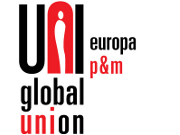News
UNI europa P&MS Committee focused on whistleblowing

During the UNI europa P&MS Committee which took place last week in Brussels, participants discussed the topic of whistleblowing. The debate on that subject started in Singapore and continued in Melbourne (2008) within UNI P&MS. It is clear that regions like Africa and the Americas are also highly interested in the debate. Two important levies are at our disposal to act when it comes to whistleblowing: regulation and education, said UNI europa P&MS President Jean-Paul Bouchet.
Michel Dessaigne, from IRESCA (International Initiative for Social Responsibility) defined whistleblowing as a fundamental right of employees. He presented the different ways of approaching whistleblowing depending on the country’s culture and history. In France for example, whistleblowing has no legal existence and no international definition is known. He added that whistleblowing mainly concerns P&MS but the impacts are felt by every employee in the company.
Guido Strack from the Whistleblower Network in Germany talked about his own experience as an EU official and said the aim of whistleblowing is to achieve change with whislteblowers not being hurt. Unfortunately, he denounced that EU courts don’t protect whistleblowers properly.
Anja Osterhuaus from Transparency International said the goal of whistleblowing is to protect the general public and avoid disasters. For instance, 25% of fraud has been discovered thanks to whistleblowers. She mentioned three key limiting factors to whistleblowing: 1. Lack of legal protection, 2. Lack of effective follow-up mechanisms in organizations, 3. Negative perceptions of whistleblowing.
Transparency International proposes actions to promote whistleblowing such as enforcement of legislation, protection vs. retaliation, protection of internal and external disclosures, cultural change... She emphasized the importance of the collaboration among the different actors (civil society, unions, business associations…) involved.
Cathy James from Public Concern at Work (UK) said people usually talk to their employer first or go to the regulator rather than to the media since it is apparently easier to address an organization that has a mandate to investigate. She concluded by saying that the Public Disclosure Act in Britain is a good start but doesn’t force organizations to establish whistleblowing procedures.
Two other organizations were introduced to the participants: Ingénieurs Sans Frontières which publishes a biannual paper on engineers’ responsibilities at work to sensitize students since very little is done during engineering education.
Per Klok from the Association of Nordic Engineers described the history and present state of engineers’ social responsibility laws and codes in Europe and in the USA.
The meeting ended by a general debate in which some unions said they were not favourable to whistleblowing since professional risks may be transferred from the company to the employees. It has been emphasised that whistleblowing should be done on a voluntary basis only. The important help that unions could provide to whistleblowers has also been discussed. A first draft resolution that you will find attached to this article has been debated as well.

